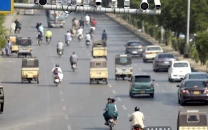Shifting the swamp
There exist few parallels of total population displacement in the recent history.

The US President's proposal to shift the entire population of Gaza to another place - most likely in the neighbouring countries - has invited worldwide criticism. Many have raised objections to its practicality. There is a genuine concern among the neighbouring states that a mass relocation of refugees may involve huge structural, administrative, financial and humanitarian implications.
The classic literature on guerrilla warfare highlights that insurgents hide among the local population just like fish in swamp. In order to apprehend these elements, one needs to have an exceptional ingress into local population or the host state must win hearts and minds of the locals to devoid insurgents of any hiding place.
The shifting of entire population from one place to another may result in more friction, animosity and probable expansion of swamp. What are some of the repercussions if this forced takeover of Gaza becomes a reality? What will happen to the swamp and its composition if it is shifted to a new place? Is an expanded protective zone being created in Gaza only or will it be extend into other countries as well?
There exist few parallels of total population displacement in the recent history. Rohingya is one example in which a large segment of population was displaced to other areas and in neighbouring countries as well. The likely impact of such a displacement needs to be determined so as to visualise the probable future situation if such an eventuality arises in Gaza.
Similarly shifting a large segment of population to another country may not work here, as one can sever his/her physical connection with one's ancestral land but the emotional attachment and psychological affinity remain intact forever. A displaced person looks for human sustenance and solace of any kind.
He or she latches on to any opportunity of network expansion so as to include people who have any knowledge or information about his/her native land or those who share the burden of his/her misery in any form.
The host community will be affected by the displacement. Countries like Egypt, Jordan and even Saudi Arabia are going to resist such a move. The refugees bring along with them stories of their miseries which tend to evoke public sympathies in the host country.
Extremist organisations operating in the host countries see it as an opportunity to expand their popularity and recruitment base. They accept the stories of the refugees and assist them in all possible manner to expand their recruitment base.
Intelligence agencies of the host countries have to perform a number of tasks so as to understand the social networking of the refugees inside and outside the country. Issues like how the refugees are connected to their native land(s); who they call regularly abroad; or for what purpose such connections have been established need to be determined and examined closely.
As the refugees arrive at a new place in a host country, their local movements are usually restricted till a comprehensive information gathering and background check is completed. Any hostile intelligence agency can easily tap the refugees to get the information on a varying range of areas pertaining to the host country to explore the fault lines for multiple purposes.
Nowadays, migrants and immigrants have become a convenient tool through which intelligence agencies gather information in public domain. They do not need to put their operators on ground as the migrants or immigrants can easily accomplish any task with alacrity.
The population mix happens once the refugees start marrying into local population. This provides them further expansion to their accessibility, numbers and reachability.
It appears as if a protective zone is going to be created not only in Gaza but also in Syria and Lebanon to blunt any chances of future action through ground routes. It may further perpetuate friction in the region unless local regimes in the neighbouring states do not control their population and refugees in an effective manner.

















COMMENTS
Comments are moderated and generally will be posted if they are on-topic and not abusive.
For more information, please see our Comments FAQ